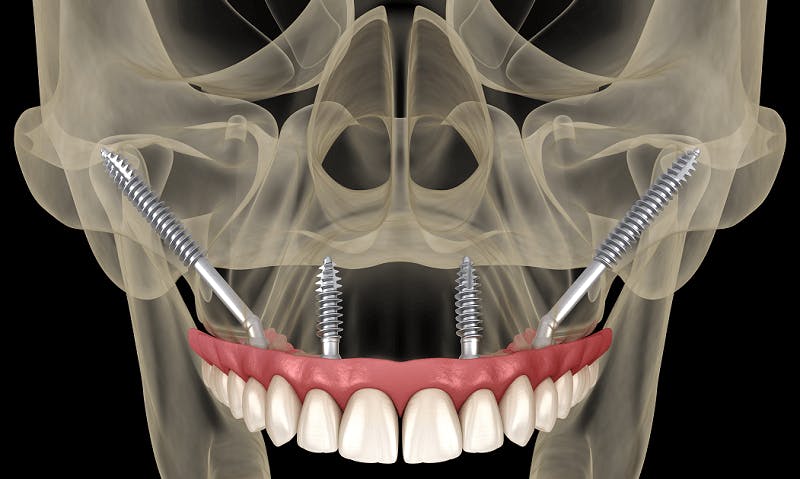Zygomatic Implants
- by Dr. Mihailo Aleksich
- Medical review by Dr. Sophie Chung, MD
- Updated:

Zygomatic implants are a type of dental implant that are anchored in the cheekbone instead of the jawbone. They are used to replace missing teeth, as an alternative treatment option for patients who do not have enough bone in their upper jaw to support traditional dental implants.
In this article, we will answer some common questions about zygomatic implants and provide you with important information if you are considering this treatment option.
The content has been reviewed for quality and accuracy to the best of our knowledge by Qunomedical and its Medical Board of Experts.
Find the Right Dental Implant Specialist at a Fraction of the Cost
Qunomedical only lists dental implants clinics and doctors that have been thoroughly vetted with quality and affordability in mind. Contact us for your 100% free, non-binding assessment.
What are zygomatic implants?
Zygomatic implants are special dental implants designed for people who have lost a lot of bone in their upper jaw, making it difficult to get traditional implants. These implants are therefore anchored in the cheekbone rather than the jawbone, and can support a replacement tooth or multiple. This provides more stability and makes it possible for people with severe bone loss to have a functional and attractive smile again.
How long do zygomatic dental implants last?
The lifespan of zygomatic implants depends on various factors, such as the patient's oral hygiene, overall health, and the quality and quantity of bone present in the zygomatic arch.
Studies show that zygomatic dental implants have a survival rate of over 95% after five years and a success rate of up to 90% after ten years.
How is it performed?
Zygomatic implants are fitted in cases of atrophy (degeneration) in the posterior jaw bone. If you do not have problems in your anterior jaw bone, conventional implants will be placed there.
The zygomatic implants procedure generally follows these steps:
You will be placed under local anaesthesia. General anaesthesia or the use of a neuroleptic may also be applied.
Following this, your dentist will make an incision and pull back the tissue to expose your zygomatic bone.
Using a drill, your dentist will create space in the zygoma into which your implant will be placed.
The implant will be placed using specially designed screws for zygomatic implants. These are available in different lengths, and have a 45° angle that compensates for the angulation between the zygoma and the maxilla.
The dental bridge will be fitted immediately following this.
Lastly, the incision will be stitched up.
How long will it take to recover from zygomatic implant surgery?
Recovering from zygomatic implants may take a little longer than traditional dental implants. After the procedure, you might feel some discomfort, swelling and bruising. It usually takes a few days to a couple of weeks for these symptoms to go away. You will also need to stick to soft foods for a few weeks after the procedure.
Find the Right Dental Implant Specialist at a Fraction of the Cost
Qunomedical only lists dental implants clinics and doctors that have been thoroughly vetted with quality and affordability in mind. Contact us for your 100% free, non-binding assessment.
What is the success rate?
The success rate of zygomatic implants is high, with a reported success rate of up to 90% after ten years. Zygomatic implants have become a reliable treatment option for patients with severe bone loss in the upper jaw.
Which complications can occur with zygomatic implants?
While zygomatic implants have a high success rate, like any dental procedure, there is the possibility that complications can arise. These may include:
Infection
Sinusitis
Paresthesia
Nerve damage
Implant failure
Prosthesis fracture
Failure of integration of implant to the bone
It is important to choose a highly experienced and skilled dental professional to perform the procedure to minimise the risk of complications. Your dental professional will also provide you with guidance on how to care for your implants after the procedure to ensure the best possible outcome.
What can I eat after zygomatic implants?
After the zygomatic implant procedure, patients should follow a soft diet for a few weeks. This includes foods such as porridge, soup, scrambled eggs, mashed potatoes, and pureed fruits.
Patients should avoid hard, crunchy, or sticky foods that can put pressure on the implants and cause discomfort. After the initial healing period, patients can gradually reintroduce harder foods into their diet.
How can I care for my zygomatic implants?
Proper oral hygiene is crucial for the long-term success of zygomatic implants. This includes brushing your teeth twice a day with a soft-bristled toothbrush and fluoride toothpaste, flossing daily, and regular dental check-ups.
What are the alternative treatments?
If zygomatic implants are not an option or preference for a patient, there are alternative treatments available. One alternative is bone grafting, where the dentist can take bone from another part of the patient's body or use synthetic bone to build up the jawbone for traditional implants. If the doctor determines that bone grafting is possible, this could be a viable option.
Another alternative is all-on-4 implants, which use just four strategically placed implants in the jawbone to support a full arch of teeth. Dentures and bridges are also options for patients who cannot undergo zygomatic implants. Here you can find more about alternative treatments:
Sources:
Perez, A. et al. (2022). Success Rates of Zygomatic Implants for the Rehabilitation of Severely Atrophic Maxilla: A Systematic Review. Accesses on March 7, 2023
Aparicio, C. et al. (2000). Zygomatic implants: indications, techniques and outcomes, and the Zygomatic Success Code. Accesses on March 7, 2023
Zygomatic Implants Quick Details
WHO IS THIS FOR
Individuals that need dental implants but have weak maxillary bone quality and quantity.
Individuals that need dental implants but prefer not having a sinus lift or a bone graft.
TREATMENT DURATION
2-4 hours depending on the complexity of your case.
POTENTIAL RISKS & SIDE EFFECTS
Sinusitis
Paresthesia
Infection at implant site
Injury/damage to surrounding vessels or teeth
Failure of integration of implant to the bone
ALTERNATIVE TREATMENTS
Zygomatic Implants Reviews
Zygomatic Implants Reviews
521.08.2023
Qunomedical have taken all the leg work out of choosing a Dentist, looking for hotels and transfers for my partner, very helpful, very friendly and very proficient!!

Patient manager
Frieda
Your personal Patient Manager
Let's talk
Still unsure? Feeling overwhelmed? Talking to a real person can give you the guidance and reassurance needed. You don’t have to do it alone. Let’s find the right doctor together.

